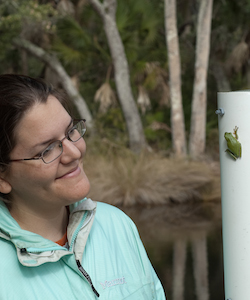
Lisa Barrow

Department Profiles
The questions that drive me focus on understanding the factors that influence the generation and maintenance of biodiversity. I am particularly interested in studying the genetic structure of co-distributed species from both a historical perspective (Has past climate change produced concordant patterns of genetic divergence across species?) and a contemporary perspective (How does landscape influence genetic connectivity of species with differing ecologies and dispersal abilities?). In pursuit of these questions, my dissertation has involved a foray into next-generation sequencing approaches to develop novel genetic markers for non-model organisms. My work has investigated the utility of reduced representation libraries and parallel tagged amplicon sequencing for phylogenetics, resulting in a more robust phylogeny for Pseudacris chorus frogs using species tree approaches (Barrow et al. 2014). I am also studying the biogeographic history and genetic structure of the Illinois chorus frog, a species of conservation concern, using Bayesian model comparison to make phylogeographic inferences. The rest of my dissertation focuses on four co-distributed frog species that I have been collecting from targeted sites throughout the Southeastern Coastal Plain to better understand the factors producing (Spoiler Alert: largely discordant?) genetic patterns in the region.
My development as a graduate student has been fostered by the tremendous support of the faculty, staff, and other graduate students of both the Biological Science and Scientific Computing departments at FSU. My extensive field collections and research activities have been possible through funding by the National Science Foundation (Graduate Research Fellowship), Society for the Study of Evolution (Rosemary Grant Award), American Museum of Natural History (Theodore Roosevelt Grant), and the American Philosophical Society (Lewis and Clark Field Scholarship). Through an NSF Doctoral Dissertation Improvement Grant, I am using targeted capture and sequencing of hundreds of genomic regions to investigate putative suture zones (regions where multiple species have overlapping genetic breaks thought to be the signature of expansion from separate glacial refugia). Before completing my dissertation, I will embark on an international graduate research opportunity in South Africa through the NSF GROW with USAID Research and Innovation Fellowship. I will be working in collaboration with the National Zoological Gardens to develop genetic tools to study a critically endangered reed frog endemic to the coast of the KwaZulu-Natal province. I am thrilled to share the knowledge and skills I have been developing as an Ecology & Evolution graduate student at FSU and am grateful for the experiences I have had here.